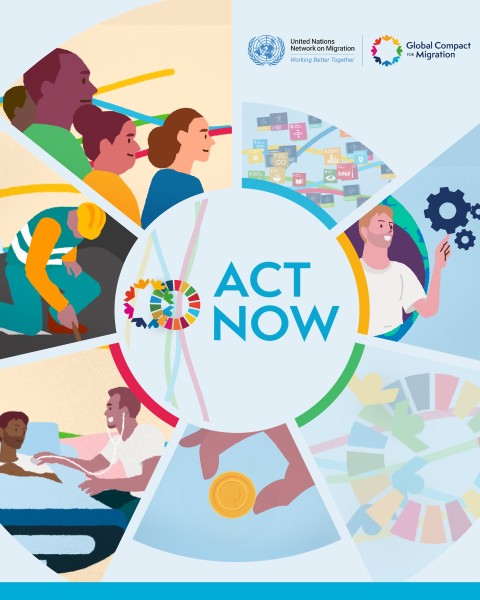Statements

Statement by the UN Network on Migration on the occasion of the 2023 SDG Summit
As the international community gathers to assess progress towards achieving the Sustainable Development Goals (SDGs), the UN Network on Migration urges Member States to recognize migrants’ and diasporas’ vital contributions to the sustainable development of all societies and address the all too frequent instances in which migrants’ rights are insufficiently protected, respected and fulfilled.
Despite the global commitment to the SDGs and progress made towards their attainment, challenges faced by migrants reveal a distressing gap in our collective efforts.
Since the adoption of the Global Compact for Safe, Orderly and Regular Migration (GCM) in 2018, over 27,000 migrants have died or gone missing during the migration journey. Limited access to regular migration pathways is a contributing factor that results in precarious living and working conditions for migrants and their families. Migrants often face limited access to adequate health and care services, or to education due to legal, financial, or administrative barriers. They too often face exploitation and discrimination in the workplace rather than enjoying decent work. Migrant women are particularly exposed to sexual violence and gender-based discrimination.
By including the 2030 Agenda for Sustainable Development as one of the GCM’s guiding principles, States recognize that well-governed migration is an accelerator of inclusive growth and sustainable development, enriching societies through social, economic and cultural contributions. With more than 281 million international migrants worldwide sending over USD 647 billion of remittances to low- and middle-income countries in 2022, they contribute to economic growth and poverty reduction, far outstripping global official development assistance.
The GCM provides a comprehensive framework that supports actors in achieving the migration-related goals and targets of the SDGs. An increasing number of States are now mainstreaming migration into development plans and sectoral policies at the local, national, regional and global levels. This includes, for instance, the integration of migration into climate change adaptation and mitigation plans, national emergency preparedness and response, as well as public health and pandemic response plans. So far, 33 States from all regions have joined the GCM Champion countries initiative to promote GCM implementation.
While COVID-19 exposed migrants to increased vulnerabilities, it also demonstrated how vital they are to the functioning of societies. In response to the pandemic, many States adopted policies related to widening access to health services and social protection, expansion of regular pathways, implementation of regularization measures and the use of alternatives to immigration detention.
However, more needs to be done. To that end, the UN Network on Migration calls on States, in partnership with all relevant stakeholders, to strengthen their commitments and to:
- Develop rights-based regular pathways and implement regularization measures to promote safe, orderly and regular migration as a means to foster sustainable development, while adjusting to increasingly complex human mobility realities affected by climate change, labour market dynamics, conflict, digitalization, urbanization, among others;
- Ensure that migrants, regardless of their nationality and migration status, and in line with universal health coverage principles, have access to health care services and can seek health care, and information in a secure environment without fear or risk of immigration control or deportation;
- Facilitate access to education and skills development and recognition, and mobility schemes offering decent jobs and social protection to sustainably respond to labour market needs and foster migrants’ socio-economic integration, while actively fighting against racism, discrimination and hate speech, and promoting social cohesion;
- Scale up efforts to reduce the costs of sending remittances to low and middle-income countries, and support diaspora engagement in favour of sustainable development in communities of origin;
- Integrate migration as a cross-cutting issue into national development plans, voluntary national reviews (VNRs) and local reviews (VLRs) as well as national emergency preparedness and response to leave no migrant behind;
- Incorporate migration considerations and the human rights of migrants in climate change and disaster risk reduction policy and action as a means of strengthening resilience and adaptive capacity to natural hazards in all countries; and,
- Collate, analyse and disaggregate data by all relevant characteristics, including migration status, to enable evidence-based policymaking to include migrants and communities in efforts to achieve sustainable development.
As States convene at the SDG Summit to discuss the progress and challenges in achieving the 17 SDGs, it is imperative that we elevate the voices and experiences of migrants. Migrants are not mere statistics or figures in the news; they are individuals driven by aspirations, dreams and the quest for a better, dignified life.
For societies to work towards achieving the various targets outlined in the SDGs, they must prioritize reaching those who too often are overlooked, discriminated against, or disadvantaged. By doing so, we contribute to achieving the transformative promise to leave no one behind and we uphold the core values of solidarity and shared prosperity that underpin the Sustainable Development Goals. Only then will we be able to bridge the gap between our aspirations and the realities migrants face.
Watch the video for the SDG Summit here.
For more information, please contact:
UN Network on Migration (secretariat)
Florence Kim
fkim@iom.int +41 79 748 0395
*References to Kosovo shall be understood to be in the context of United Nations Security Council resolution 1244 (1999).
Newsletter
Subscribe to our newsletter.